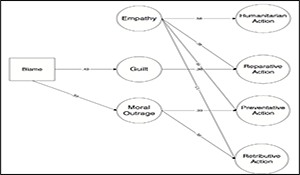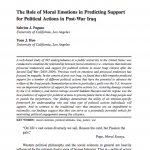Moral Emotions – Predicting Political Attitudes

The role of moral emotions in predicting political attitudes about post-war Iraq.
Author: Polansky (Pagano), S. & Huo, Y. J.
Abstract
A web-based study of 393 undergraduates at a public university in the United States was conducted to examine the relationship between moral emotions (i.e., emotions that motivate prosocial tendencies) and support for political actions to assist Iraqi citizens after the Second Gulf War (2003–2004). Previous work on emotions and prosocial tendencies has focused on empathy. In the context of post-war Iraq, we found that while empathy predicted support for a number of different political actions that have the potential to advance the welfare of the Iraqi people (humanitarian action in particular), guilt over the U.S. invasion was an important predictor of support for reparative actions (i.e., restoring damage created by the U.S. military), and moral outrage toward Saddam Hussein and his regime was the best predictor of support for political actions to prevent future harm to the Iraqi people and to punish the perpetrators. Our findings demonstrate the utility of an emotion-specific framework for understanding why and what type of political actions individuals will support. And in contrast to the traditional view that emotions are an impediment to rationality, our findings suggest that they can serve as a potentially powerful vehicle for motivating political engagement among the citizenry.
Conclusion
Each study inevitably has its limitations. However, we believe that the strength of the current study lies in its systematic examination of the specific pattern of relationships between each of three moral emotions and support for different political actions in the context of an engaging and important real-life political event. This examination allows us to infer which discrete emotion is most strongly associated with a given form of political support. The differences in the relation- ships between each of these emotions and their related action tendencies have implications for the type of political appeals that should be made. These political appeals may in turn have consequences for helping behavior and political support. The overall pattern of results from this study therefore provides support for the use of empathy, guilt, and moral outrage in concert with one another in a focused and relatively comprehensive approach to motivate support for distinct political actions.
Citation
Pagano, S. J. & Huo, Y. J. (2007). “The role of moral emotions in predicting political attitudes about post-war Iraq.” Political Psychology, 28(2), 227-255.

Comments